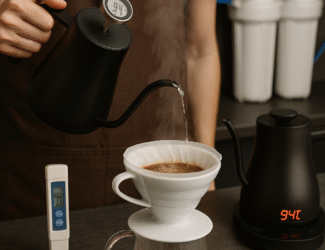
Study Dispels Fears: Hospital Coffee Machines Unlikely to Be a Source of Superbug Spread
Healthcare workers can breathe a sigh of relief as a recent study, featured in The BMJ’s Christmas issue, dismisses the notion that hospital coffee machines contribute to the spread of diseases. The findings suggest that a general ban on these machines is unnecessary.
In the ongoing efforts to combat hospital-acquired infections, various items, including doctors’ ties and even hospital Bibles, have been scrutinized as potential breeding grounds for bacteria. Surprisingly, hospital coffee machines, despite frequent contact with numerous hands, had not been thoroughly investigated until now.
To address this gap in knowledge, German researchers conducted a comprehensive assessment of the microbial population in healthcare-associated coffee machines, focusing on the World Health Organization’s high-priority “ESKAPE” pathogens. These pathogens, resistant to many antibiotics, pose a significant threat, potentially leading to fatal infections.
Between October 31 and December 31, 2022, the researchers swabbed a total of 25 coffee makers, including fully automatic, capsule (e.g., Nespresso), and espresso machines. Seventeen machines were located in break rooms and offices at a university hospital, while eight were in staff members’ homes. All machines had been in use for at least a year, and none underwent special cleaning before sampling. Importantly, there were no ongoing disease outbreaks at any of the locations during the sampling period.
Swabs were taken from five specified sites on each coffee machine: the drip tray, the outlet, the buttons, the handle of the water tank, and the inside of the water tank. Microbial species were identified through cultures using spectrometry, with pathogens categorized as “medically relevant” and commensals as “atypical pathogens.” Gram type differentiation was used to distinguish positive or negative species.
Notably, microbial growth was found on every coffee machine, with hospital machines being approximately three times more heavily colonized than home machines. The majority of detected species were harmless commensals, and only a few medically relevant, non-antibiotic-resistant pathogens were identified.
The study emphasized the importance of following hand hygiene protocols, as 81% of medically relevant Gram-negative species were discovered in hospital coffee makers, primarily in drip trays, outlets, and water tank handles. Staphylococcus aureus, a potentially disease-causing Gram-positive species, was found in minimal instances, reinforcing the need for thorough hand hygiene.
The authors of the study expressed relief that, despite the potential for pathogen origin in nosocomial outbreaks, a widespread ban on coffee makers is unwarranted. Additionally, the study has prompted enhanced cleaning measures. The authors also raise intriguing questions about tea-related items in nations that favor tea, pondering whether teapots, kettles, and hot water spouts may serve as similar breeding grounds for bacteria and whether high temperatures in pots are sufficient to eliminate potential pathogens.



